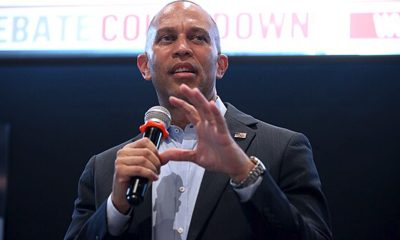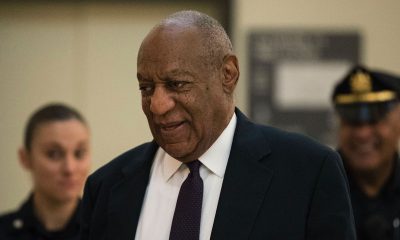Entertainment
Hollywood Sex Abuse Documentary Screens in Cannes

In this Nov. 14, 2014 file photo, director Amy Berg poses with Evan Henzi from the film, at the world premiere of “An Open Secret” during DOC NYC at the SVA Theater, New York. Documentary An Open Secret by Amy Berg, screens at the 68th international Cannes film festival. (Photo by Evan Agostini/Invision/AP)
JILL LAWLESS, Associated Press
CANNES, France (AP) — A dark side of the movie world has played out onscreen at Cannes in “An Open Secret,” a documentary about child sexual abuse that calls itself “the movie Hollywood doesn’t want you to see.”
The film features interviews with former child actors and models who were abused by agents, managers and other industry figures. The filmmakers hope it will encourage more victims to speak out.
“Once kids see that we stick up for the victims, then that’s when I think more people will come forward,” Evan Henzi, a former child performer who was abused by his manager, said after a Tuesday screening.
Henzi said his abuse “started when I was 11 and I didn’t come forward until I was 18, and it ruined my entire childhood.”
The film is directed by acclaimed documentarian Amy Berg, who made miscarriage-of-justice story “West of Memphis” and the Academy Award-nominated “Deliver us from Evil,” about child abuse in the Roman Catholic church.
“An Open Secret” treads a careful legal line, naming only abusers who have been convicted of sex offenses.
One of the interviewees is Michael Egan, a former child actor who filed — and then dropped — a lawsuit accusing “X-Men” director Bryan Singer of sexually abusing him. Singer has denied the claims, and the film does not make allegations against him, though he is named as an acquaintance of digital entertainment entrepreneur Marc Collins-Rector, who was convicted of sex charges involving minors.
“An Open Secret” will have a limited release in 20 U.S. cities starting June 5, and is seeking foreign buyers in Cannes, where it screened outside the festival selection.
It focuses on a handful of victims who were willing to speak on camera, but former Olympic diving champion Greg Louganis, who is in Cannes to support the movie, said this is “the tip of the iceberg in Hollywood.”
“This also extends into the sporting world, too,” said Louganis, who has spoken about his own experiences as a victim of sexual abuse.
“There is so much money involved that silence can be bought,” he said. “This is about intimidation and having power and control.”
___
Follow Jill Lawless on Twitter at http://Twitter.com/JillLawless
Copyright 2015 The Associated Press. All rights reserved. This material may not be published, broadcast, rewritten or redistributed.
Activism
OP-ED: AB 1349 Puts Corporate Power Over Community
Since Ticketmaster and Live Nation merged in 2010, ticket prices have jumped more than 150 percent. Activities that once fit a family’s budget now take significant disposable income that most working families simply don’t have. The problem is compounded by a system that has tilted access toward the wealthy and white-collar workers. If you have a fancy credit card, you get “presale access,” and if you work in an office instead of a warehouse, you might be able to wait in an online queue to buy a ticket. Access now means privilege.

By Bishop Joseph Simmons, Senior Pastor, Greater St. Paul Baptist Church, Oakland
As a pastor, I believe in the power that a sense of community can have on improving people’s lives. Live events are one of the few places where people from different backgrounds and ages can share the same space and experience – where construction workers sit next to lawyers at a concert, and teenagers enjoy a basketball game with their grandparents. Yet, over the past decade, I’ve witnessed these experiences – the concerts, games, and cultural events where we gather – become increasingly unaffordable, and it is a shame.
These moments of connection matter as they form part of the fabric that holds communities together. But that fabric is fraying because of Ticketmaster/Live Nation’s unchecked control over access to live events. Unfortunately, AB 1349 would only further entrench their corporate power over our spaces.
Since Ticketmaster and Live Nation merged in 2010, ticket prices have jumped more than 150 percent. Activities that once fit a family’s budget now take significant disposable income that most working families simply don’t have. The problem is compounded by a system that has tilted access toward the wealthy and white-collar workers. If you have a fancy credit card, you get “presale access,” and if you work in an office instead of a warehouse, you might be able to wait in an online queue to buy a ticket. Access now means privilege.
Power over live events is concentrated in a single corporate entity, and this regime operates without transparency or accountability – much like a dictator. Ticketmaster controls 80 percent of first-sale tickets and nearly a third of resale tickets, but they still want more. More power, more control for Ticketmaster means higher prices and less access for consumers. It’s the agenda they are pushing nationally, with the help of former Trump political operatives, who are quietly trying to undo the antitrust lawsuit launched against Ticketmaster/Live Nation under President Biden’s DOJ.
That’s why I’m deeply concerned about AB 1349 in its current form. Rather than reining in Ticketmaster’s power, the bill risks strengthening it, aligning with Trump. AB 1349 gives Ticketmaster the ability to control a consumer’s ticket forever by granting Ticketmaster’s regime new powers in state law to prevent consumers from reselling or giving away their tickets. It also creates new pathways for Ticketmaster to discriminate and retaliate against consumers who choose to shop around for the best service and fees on resale platforms that aren’t yet controlled by Ticketmaster. These provisions are anti-consumer and anti-democratic.
California has an opportunity to stand with consumers, to demand transparency, and to restore genuine competition in this industry. But that requires legislation developed with input from the community and faith leaders, not proposals backed by the very company causing the harm.
Will our laws reflect fairness, inclusion, and accountability? Or will we let corporate interests tighten their grip on spaces that should belong to everyone? I, for one, support the former and encourage the California Legislature to reject AB 1349 outright or amend it to remove any provisions that expand Ticketmaster’s control. I also urge community members to contact their representatives and advocate for accessible, inclusive live events for all Californians. Let’s work together to ensure these gathering spaces remain open and welcoming to everyone, regardless of income or background.
Activism
Oakland Post: Week of December 31, 2025 – January 6, 2026
The printed Weekly Edition of the Oakland Post: Week of – December 31, 2025 – January 6, 2026

To enlarge your view of this issue, use the slider, magnifying glass icon or full page icon in the lower right corner of the browser window.
Activism
Oakland Post: Week of December 24 – 30, 2025
The printed Weekly Edition of the Oakland Post: Week of – December 24 – 30, 2025

To enlarge your view of this issue, use the slider, magnifying glass icon or full page icon in the lower right corner of the browser window.
-

 Activism4 weeks ago
Activism4 weeks agoDesmond Gumbs — Visionary Founder, Mentor, and Builder of Opportunity
-

 Activism4 weeks ago
Activism4 weeks agoFamilies Across the U.S. Are Facing an ‘Affordability Crisis,’ Says United Way Bay Area
-

 Alameda County3 weeks ago
Alameda County3 weeks agoOakland Council Expands Citywide Security Cameras Despite Major Opposition
-

 Alameda County3 weeks ago
Alameda County3 weeks agoBling It On: Holiday Lights Brighten Dark Nights All Around the Bay
-

 Activism4 weeks ago
Activism4 weeks agoBlack Arts Movement Business District Named New Cultural District in California
-

 Activism4 weeks ago
Activism4 weeks agoLu Lu’s House is Not Just Toying Around with the Community
-

 Activism4 weeks ago
Activism4 weeks agoOakland Post: Week of December 17 – 23, 2025
-

 Activism2 weeks ago
Activism2 weeks agoFirst 5 Alameda County Distributes Over $8 Million in First Wave of Critical Relief Funds for Historically Underpaid Caregivers






















































